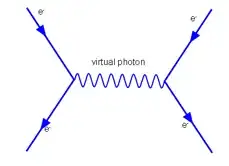So I have seen an animation about Stephen Hawking (after his recent study state universes claim) that Hawking evaporation is due to negative mass; But how is this possible? I mean, there is no such thing as negative mass!
2 Answers
You do not state the level of understanding you have in physics.
Negative mass is a mathematical construct necessary to explain Hawking radiation, and is due to what are called virtual particles.
These are lines in Feynman diagrams which diagrams are a shorthand in generating the integrals necessary for the calculation of crossections and lifetimes in elementary particles.
This is a Feynman diagram of electron electron scattering or electron positron annihilation, depending on the axis taken for time:

The photon is virtual because it is not on the mass shell: In the diagram the incoming from the left have at least 1MeV invariant mass and the same is true for the outgoing on the right. A real photon has mass zero, so the photon line is called virtual because it is off its mass shell, unreal. In virtual particle exchanges the "particle" has all the quantum numbers of its name except the four vector describing it is off mass shell, positive or negative.
Hawking radiation involves loops of virtual particles, i.e. particles off mass shell, over the event horizon. When one becomes real , then the other one falls into the black hole, mathematically having negative mass, as it is virtual. The energy for the whole interaction is taken out of the gravitational field of the black hole. See also my answer to a similar question here.
That's a way to interpret it...and I agree that it is a confusing one in my view. To be honest, the way I see it is as if the black hole was in an excited state so high in energy that it can emit massive particles.
The emission would be of the type
$BH^* \rightarrow BH + p$
where $BH$ stands for black hole and $p$ for particle. During this reaction, you have to conserve momentum and energy and the fact that it is a black hole doesn't change that fact. Charge has to be conserved as well so I would imagine that if the black hole radiates a charged particle, it becomes charged as well.
Some other stuff are usually conserved in such reactions (e.g. leptonic or baryonic numbers etc..) but I don't know what happens to them in this case.
Maybe this betrays the limitations of my naive point of view.
- 7,550